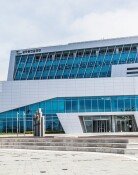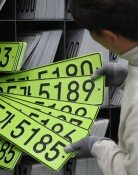First ever three-parent baby
First ever three-parent baby
Posted October. 19, 2016 07:36,
Updated October. 19, 2016 07:45
Mahmoud Hassan and his wife, U.S. citizens who are from Jordan, lost two children due to Leigh syndrome, an inherited neurometabolic disorder. Though the mother was healthy, the children inherited defective genes through their mother’s mitochondria. Mitochondrion is inherited only through eggs. The couple had a healthy baby after replacing the cellular nucleus of the mother’s egg, inserting it into a donor egg and fertilizing the hybrid egg with the father’s sperm. This was the birth of the “three-parent child” which surprised the world recently.
The child with two mothers and one father heralded the era of customized genes and sparked controversy over ethics issues. Some warn that genetic engineering is against nature and could cause unpredictable and destructive results. Though Dr. John Zhang who did the Jordanian couple’s procedure said, “Saving lives is always the ethical imperative,” the procedure failed to get permission from the U.S. Food and Drug Administration and took place in Mexico.
Shoukhrat Mitalipov, a professor at the Oregon Health and Science University, visited Korea and said, “A three-parent child can be born in Korea within a year.” He created six cloning embryos after injecting skin cells in an egg where the nucleus was removed in 2013, and seven monkeys were born based on the same method. However, there is a precondition. It requires the Korean government’s permission. In other words, a “three parent child” is not a matter of technology but regulation. If the government approves the procedure despite the ethical controversy, a three-parent child can be born in any country.
It is easy to remove and insert a DNA with the DNA scissors technology. The cutting-edge technology, which is comparable to the revolution of organisms, is generating tremendous results in plants and animals. The last obstacle is whether human beings can be the subject of such testing. The U.K. approved the gene editing research on human embryos using DNA scissors for the first time in the world early this year. The U.S. also approved a clinical research for cancer patients. Though the religious community would strongly oppose the idea for ethical reasons, it would not be able to reverse the great trend of the gene editing technology compensating humans’ defects.
정성희기자 shchung@donga.com
Headline News
- N. Korea launches cyberattacks on S. Korea's defense companies
- Major university hospital professors consider a day off each week
- Italy suffers from fiscal deficits from ‘Super Bonus’ scheme
- Inter Milan secures 20th Serie A title, surpassing AC Milan
- Ruling and opposition prioritize spending amid tax revenue shortfalls







